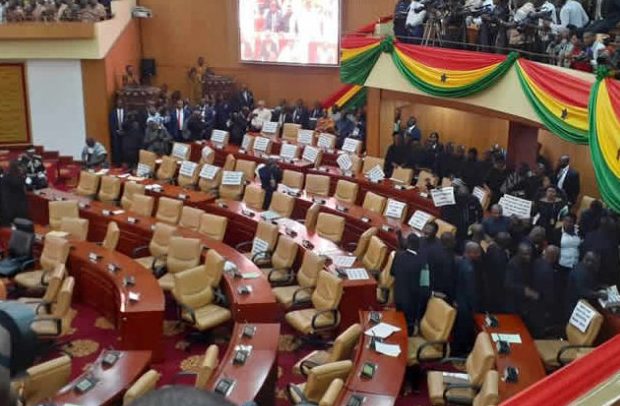THE MINORITY Members of Parliament (MPs) yesterday ran away from their own question, indicating that they were no more interested in knowing how much government had spent on the implementation of the Free Senior High School (SHS) programme.
The National Democratic Congress (NDC) MP for Mion, Mohammed Abdul-Aziz, had filed a question to ask the Minister of Education how much government spent on the implementation of the Free SHS from the 2016/2017 academic year to date.
The Deputy Minister of Education, Dr. Yaw Osei Adutwum, was in the House to respond to the question and other related ones on behalf of the Education Minister, Dr. Matthew Opoku Prempeh.
After answering questions on the cost of examination fee paid by government for BECE candidates and details on the number, type and location of educational infrastructure completed, the Deputy Education Minister was set forth to respond to the last question bordering on the Free SHS policy.
Surprisingly, the Minority NDC MPs cleverly declined to ask the question set out in the order paper and said they were no longer interested in it.
No amount of persuasion, including an offer by the Majority Leader, Osei Kyei-Mensah-Bonsu, to ask the question on behalf of the NDC member, could let them budge.
They still insisted they were abandoning the Free SHS question and at a point Minority Chief Whip Muntaka Mubarak Mohammed tried to counter the Majority Leader, and the Speaker, Prof. Mike Ocquaye, cut in to say “it is okay, let’s make progress.”
However, the answer as provided for by the Education Minister indicated that there was no Free SHS programme in the NDC era, and that what was being implemented in the 2016/2017 academic year was the progressively Free SHS which had arrears of GH¢34, 053,798 “which we paid when we assumed office in 2017.”
“Mr. Speaker, the Free Senior High School programme was rolled out at the beginning of the 2017/2018 academic year to primarily address inequality among students through the removal of cost barriers whilst enhancing quality.”
The Education Minister provided on the order paper that “students who would otherwise have terminated schooling at junior high school (JHS) level can now acquire functional and employable skills through the acquisition of quality Free Secondary Education.”
The answer indicated that government had so far released an amount of GH¢3,551,413,786.80 from the beginning of the programme to date.
It said in the 2017/2018 academic year, an amount of GH¢899,524,466.30 was released, while GH¢1,269,622,222.10 was released for the 2018/2019 academic year and GH¢1,382,267,098.40.
On the double track system, Dr. Adutwum said the system was an interim measure the ministry employed to enroll all qualified students into SHS.
“The measure was necessitated due to the increased numbers of students from the junior high schools against the limited infrastructure at the secondary level as of that time.
“Mr. Speaker, implementation of the double track system commenced at the beginning of the 2018/2019 academic year. Currently, the system is being implemented in 381 out of the 721 public senior high schools across the country.
“We planned to phase it out over the next 6-7 years. With the expansion of infrastructure in the various senior high schools across the country, the number of schools on the double track is expected to be reduced in the next academic year,” he said.
According to him, government, in the 2018 budget statement, announced to fully absorb the examination registration fees for all public junior high school candidates in the Basic Education Certificate Examinations (BECE). This was an improvement over the previous subsidy of 70 per cent.
“In May 2019, government released in full the provision of GH¢29,083,300.00 in the 2019 budget to the West African Examinations Council (WAEC) for the conduct of the 2019 BECE,” he added.
By Ernest Kofi Adu, Parliament House


